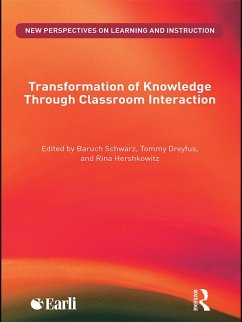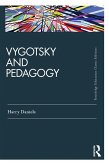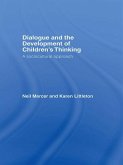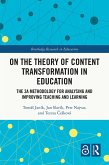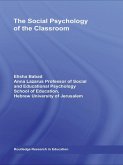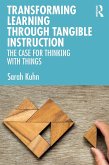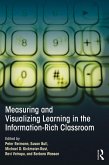Transformation of Knowledge through Classroom Interaction (eBook, ePUB)
Redaktion: Schwarz, Baruch; Hershkowitz, Rina; Dreyfus, Tommy
49,95 €
49,95 €
inkl. MwSt.
Sofort per Download lieferbar

25 °P sammeln
49,95 €
Als Download kaufen

49,95 €
inkl. MwSt.
Sofort per Download lieferbar

25 °P sammeln
Jetzt verschenken
Alle Infos zum eBook verschenken
49,95 €
inkl. MwSt.
Sofort per Download lieferbar
Alle Infos zum eBook verschenken

25 °P sammeln
Transformation of Knowledge through Classroom Interaction (eBook, ePUB)
Redaktion: Schwarz, Baruch; Hershkowitz, Rina; Dreyfus, Tommy
- Format: ePub
- Merkliste
- Auf die Merkliste
- Bewerten Bewerten
- Teilen
- Produkt teilen
- Produkterinnerung
- Produkterinnerung

Bitte loggen Sie sich zunächst in Ihr Kundenkonto ein oder registrieren Sie sich bei
bücher.de, um das eBook-Abo tolino select nutzen zu können.
Hier können Sie sich einloggen
Hier können Sie sich einloggen
Sie sind bereits eingeloggt. Klicken Sie auf 2. tolino select Abo, um fortzufahren.

Bitte loggen Sie sich zunächst in Ihr Kundenkonto ein oder registrieren Sie sich bei bücher.de, um das eBook-Abo tolino select nutzen zu können.
Transformation of Knowledge through Classroom Interaction examines and evaluates different ways which have been used to support students learning in classrooms.
- Geräte: eReader
- mit Kopierschutz
- eBook Hilfe
- Größe: 1.9MB
Andere Kunden interessierten sich auch für
![Vygotsky and Pedagogy (eBook, ePUB) Vygotsky and Pedagogy (eBook, ePUB)]() Harry DanielsVygotsky and Pedagogy (eBook, ePUB)42,95 €
Harry DanielsVygotsky and Pedagogy (eBook, ePUB)42,95 €![School, Family, And Community Interaction (eBook, ePUB) School, Family, And Community Interaction (eBook, ePUB)]() Cheryl L FagnanoSchool, Family, And Community Interaction (eBook, ePUB)42,95 €
Cheryl L FagnanoSchool, Family, And Community Interaction (eBook, ePUB)42,95 €![Dialogue and the Development of Children's Thinking (eBook, ePUB) Dialogue and the Development of Children's Thinking (eBook, ePUB)]() Neil MercerDialogue and the Development of Children's Thinking (eBook, ePUB)45,95 €
Neil MercerDialogue and the Development of Children's Thinking (eBook, ePUB)45,95 €![On the Theory of Content Transformation in Education (eBook, ePUB) On the Theory of Content Transformation in Education (eBook, ePUB)]() Tomás JaníkOn the Theory of Content Transformation in Education (eBook, ePUB)42,95 €
Tomás JaníkOn the Theory of Content Transformation in Education (eBook, ePUB)42,95 €![The Social Psychology of the Classroom (eBook, ePUB) The Social Psychology of the Classroom (eBook, ePUB)]() Elisha BabadThe Social Psychology of the Classroom (eBook, ePUB)46,95 €
Elisha BabadThe Social Psychology of the Classroom (eBook, ePUB)46,95 €![Transforming Learning Through Tangible Instruction (eBook, ePUB) Transforming Learning Through Tangible Instruction (eBook, ePUB)]() Sarah KuhnTransforming Learning Through Tangible Instruction (eBook, ePUB)33,95 €
Sarah KuhnTransforming Learning Through Tangible Instruction (eBook, ePUB)33,95 €![Measuring and Visualizing Learning in the Information-Rich Classroom (eBook, ePUB) Measuring and Visualizing Learning in the Information-Rich Classroom (eBook, ePUB)]() Measuring and Visualizing Learning in the Information-Rich Classroom (eBook, ePUB)55,95 €
Measuring and Visualizing Learning in the Information-Rich Classroom (eBook, ePUB)55,95 €-
-
-
Transformation of Knowledge through Classroom Interaction examines and evaluates different ways which have been used to support students learning in classrooms.
Dieser Download kann aus rechtlichen Gründen nur mit Rechnungsadresse in A, B, BG, CY, CZ, D, DK, EW, E, FIN, F, GR, HR, H, IRL, I, LT, L, LR, M, NL, PL, P, R, S, SLO, SK ausgeliefert werden.
Produktdetails
- Produktdetails
- Verlag: Taylor & Francis eBooks
- Seitenzahl: 336
- Erscheinungstermin: 7. Mai 2009
- Englisch
- ISBN-13: 9781134007318
- Artikelnr.: 38258113
- Verlag: Taylor & Francis eBooks
- Seitenzahl: 336
- Erscheinungstermin: 7. Mai 2009
- Englisch
- ISBN-13: 9781134007318
- Artikelnr.: 38258113
- Herstellerkennzeichnung Die Herstellerinformationen sind derzeit nicht verfügbar.
Baruch Schwarz is Associate Professor of Education, School of Education, The Hebrew University of Jerusalem, Israel. Tommy Dreyfus is Professor of Science Education, Tel Aviv University, Israel. Rina Hershkowitz is Head Researcher, Department of Science Teaching, Weizmann Institute of Science, Israel.
Introduction Part 1: Construction of knowledge in classroom interaction
1.1: The nested epistemic actions model for abstraction in context 1.2: The
construction of physics knowledge in the classroom from different
perspectives: the classroom as a community and the students as individuals
1.3: Technology-based algebra learning: epistemological discontinuities and
curricular implications 1.4: Toward a trialogical approach to learning 1.5:
Commentary on the chapters on the construction of knowledge Part 2: The
role of the teacher in the transformation of knowledge in classroom
interaction 2.1: Expert support for group work in elementary science: the
role of consensus 2.2: Guidance in construction of knowledge: the troika of
talk, tasks, and tools 2.3: Implementing technology-facilitated
collaboration and awareness in the classroom - roles for teachers,
educational researchers and technology experts Part 3: The role of
argumentation and dialogue in transformation of knowledge 3.1:
intersubjective and intrasubjective rationalities in pedagogical debates:
realising what one thinks 3.2: Transformation of robust misconceptions
through peer argumentation 3.3: Commentary of the chapters by Baker and
Asterhan & Schwarz through the lenses of commognition 3.4: A dialogue on
dialogue and its place within education Part 4: Methodologies for studying
transformation of knowledge in classroom interaction 4.1: A methodological
framework and empirical techniques for studying the travel of ideas in
classroom communities 4.2: A design research perspective on the identities
that students are developing in mathematics classrooms 4.3: Methodological
considerations for the study of intersubjectivitity among participants of a
dialogic mathematics classroom 4.4: Comparing and Contrasting
Methodologies: a commentary Part 5: General reflections on transformation
of knowledge in classroom interaction 5.1: Contour lines between a model as
a theoretical framework and the same model as methodological tool 5.2:
Learning in schools: a dialectical materialistic, cultural-istorical
activity theoretic perspective 5.3: Sociogenesis and cognition: the
struggle between social and cognitive activities
1.1: The nested epistemic actions model for abstraction in context 1.2: The
construction of physics knowledge in the classroom from different
perspectives: the classroom as a community and the students as individuals
1.3: Technology-based algebra learning: epistemological discontinuities and
curricular implications 1.4: Toward a trialogical approach to learning 1.5:
Commentary on the chapters on the construction of knowledge Part 2: The
role of the teacher in the transformation of knowledge in classroom
interaction 2.1: Expert support for group work in elementary science: the
role of consensus 2.2: Guidance in construction of knowledge: the troika of
talk, tasks, and tools 2.3: Implementing technology-facilitated
collaboration and awareness in the classroom - roles for teachers,
educational researchers and technology experts Part 3: The role of
argumentation and dialogue in transformation of knowledge 3.1:
intersubjective and intrasubjective rationalities in pedagogical debates:
realising what one thinks 3.2: Transformation of robust misconceptions
through peer argumentation 3.3: Commentary of the chapters by Baker and
Asterhan & Schwarz through the lenses of commognition 3.4: A dialogue on
dialogue and its place within education Part 4: Methodologies for studying
transformation of knowledge in classroom interaction 4.1: A methodological
framework and empirical techniques for studying the travel of ideas in
classroom communities 4.2: A design research perspective on the identities
that students are developing in mathematics classrooms 4.3: Methodological
considerations for the study of intersubjectivitity among participants of a
dialogic mathematics classroom 4.4: Comparing and Contrasting
Methodologies: a commentary Part 5: General reflections on transformation
of knowledge in classroom interaction 5.1: Contour lines between a model as
a theoretical framework and the same model as methodological tool 5.2:
Learning in schools: a dialectical materialistic, cultural-istorical
activity theoretic perspective 5.3: Sociogenesis and cognition: the
struggle between social and cognitive activities
Introduction Part 1: Construction of knowledge in classroom interaction
1.1: The nested epistemic actions model for abstraction in context 1.2: The
construction of physics knowledge in the classroom from different
perspectives: the classroom as a community and the students as individuals
1.3: Technology-based algebra learning: epistemological discontinuities and
curricular implications 1.4: Toward a trialogical approach to learning 1.5:
Commentary on the chapters on the construction of knowledge Part 2: The
role of the teacher in the transformation of knowledge in classroom
interaction 2.1: Expert support for group work in elementary science: the
role of consensus 2.2: Guidance in construction of knowledge: the troika of
talk, tasks, and tools 2.3: Implementing technology-facilitated
collaboration and awareness in the classroom - roles for teachers,
educational researchers and technology experts Part 3: The role of
argumentation and dialogue in transformation of knowledge 3.1:
intersubjective and intrasubjective rationalities in pedagogical debates:
realising what one thinks 3.2: Transformation of robust misconceptions
through peer argumentation 3.3: Commentary of the chapters by Baker and
Asterhan & Schwarz through the lenses of commognition 3.4: A dialogue on
dialogue and its place within education Part 4: Methodologies for studying
transformation of knowledge in classroom interaction 4.1: A methodological
framework and empirical techniques for studying the travel of ideas in
classroom communities 4.2: A design research perspective on the identities
that students are developing in mathematics classrooms 4.3: Methodological
considerations for the study of intersubjectivitity among participants of a
dialogic mathematics classroom 4.4: Comparing and Contrasting
Methodologies: a commentary Part 5: General reflections on transformation
of knowledge in classroom interaction 5.1: Contour lines between a model as
a theoretical framework and the same model as methodological tool 5.2:
Learning in schools: a dialectical materialistic, cultural-istorical
activity theoretic perspective 5.3: Sociogenesis and cognition: the
struggle between social and cognitive activities
1.1: The nested epistemic actions model for abstraction in context 1.2: The
construction of physics knowledge in the classroom from different
perspectives: the classroom as a community and the students as individuals
1.3: Technology-based algebra learning: epistemological discontinuities and
curricular implications 1.4: Toward a trialogical approach to learning 1.5:
Commentary on the chapters on the construction of knowledge Part 2: The
role of the teacher in the transformation of knowledge in classroom
interaction 2.1: Expert support for group work in elementary science: the
role of consensus 2.2: Guidance in construction of knowledge: the troika of
talk, tasks, and tools 2.3: Implementing technology-facilitated
collaboration and awareness in the classroom - roles for teachers,
educational researchers and technology experts Part 3: The role of
argumentation and dialogue in transformation of knowledge 3.1:
intersubjective and intrasubjective rationalities in pedagogical debates:
realising what one thinks 3.2: Transformation of robust misconceptions
through peer argumentation 3.3: Commentary of the chapters by Baker and
Asterhan & Schwarz through the lenses of commognition 3.4: A dialogue on
dialogue and its place within education Part 4: Methodologies for studying
transformation of knowledge in classroom interaction 4.1: A methodological
framework and empirical techniques for studying the travel of ideas in
classroom communities 4.2: A design research perspective on the identities
that students are developing in mathematics classrooms 4.3: Methodological
considerations for the study of intersubjectivitity among participants of a
dialogic mathematics classroom 4.4: Comparing and Contrasting
Methodologies: a commentary Part 5: General reflections on transformation
of knowledge in classroom interaction 5.1: Contour lines between a model as
a theoretical framework and the same model as methodological tool 5.2:
Learning in schools: a dialectical materialistic, cultural-istorical
activity theoretic perspective 5.3: Sociogenesis and cognition: the
struggle between social and cognitive activities
